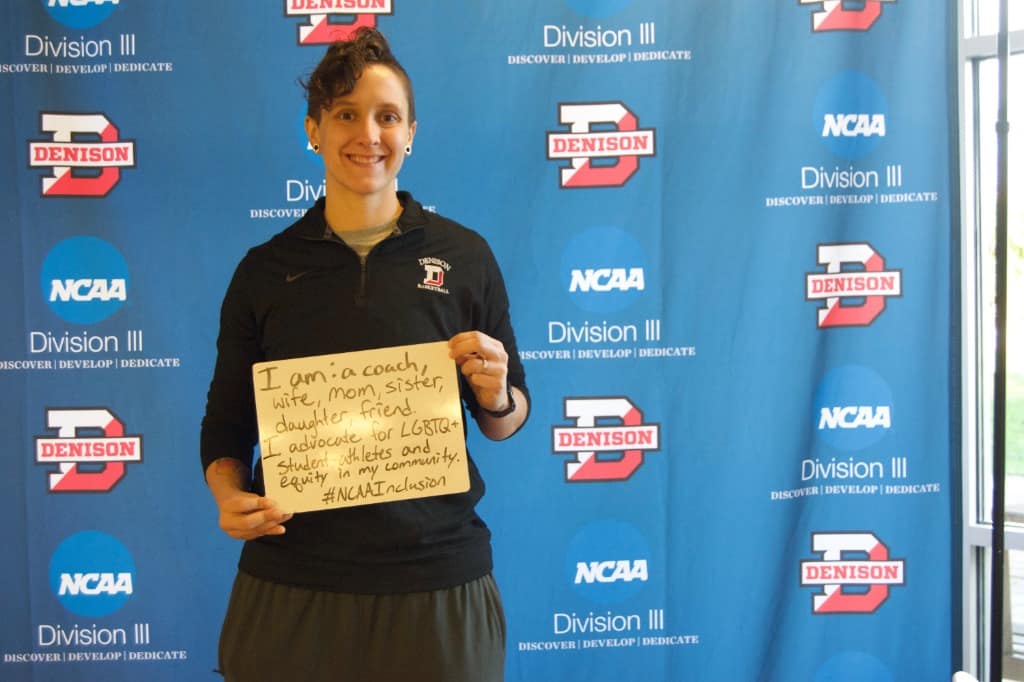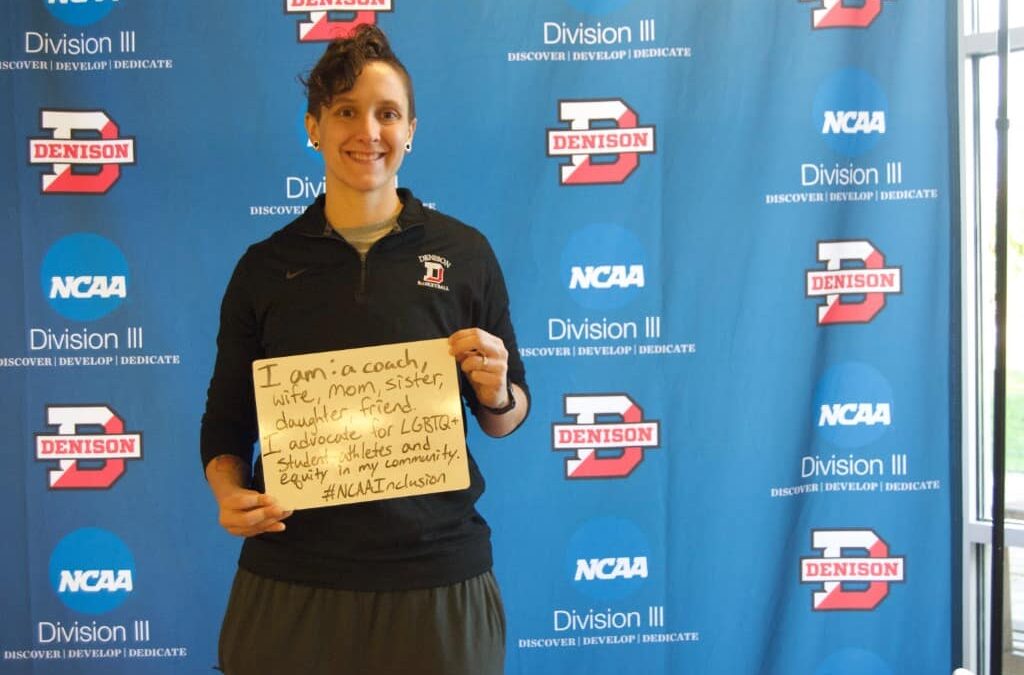
AARON SKUBBY, Editor-in-Chief—
Diversity, equity, inclusion, and antiracism have become staples in the lexicon of practically any higher education institution. But for Denison Athletics, the pursuit of these four words has presented unique challenges that they have been facing head on.
According to data from the National Center of Education Statistics, in Fall 2020 the Denison student body was 59.8% white. But as professor and former basketball coach Bob Ghiloni explains, among student athletes that number is approximately 80%. “The student body is listed as around 35% diverse, our student athletes are about 20% diverse. So we’re behind,” Ghiloni said in an interview with The Denisonian.
Senior staff in Denison Athletics have approached antiracist work with passion, but recognize the significant amount of work that needs to be done. “This department has done a good job at keeping this issue at the forefront,” Ghiloni said. Athletic Director Nan Carney-DeBord emphasized the role that antiracism plays within athletics’ core values, commonly known as “The Wheel.” Those values are trust, teamwork, integrity, leadership, growth mindset, and diversity.
One particular challenge highlighted by both Carney-DeBord and Ghiloni is the need for more deliberately antiracist recruitment practices. “Our goal is to have our recruiting and the demographics of our teams match that of our university, and with our enrollment as it is we have to be much more intentional about recruiting people of color if that is not already happening,” Carney-DeBord said. Systemic injustices contribute to the difficulty of equitable recruiting for athletic coaches. “It was easy to go to the North Shore of Chicago, the suburbs, and recruit athletes,” Ghiloni said. He emphasized how students from privileged backgrounds did not need to worry about grades, college applications, and other parts of their college application process.
“I don’t know if someone in Newark Ohio would know the game of Field Hockey, because it’s not in the Newark City Schools,” Carney-DeBord said. Sports such as golf, lacrosse, and field hockey can require expensive equipment, and programs in these sports are often found in private schools, but not lower-income school districts. As such, the diversity of teams varies heavily between different sports.
“I don’t know if someone in Newark Ohio would know the game of Field Hockey, because it’s not in the Newark City Schools.”
Athletic Director Nan Carney-DeBord
As a Division III school, Denison does not offer athletic scholarships – and a price tag over $70,000 a year can prove a daunting challenge for many students.
Nationally, 56% of Division I athletes are white, according to the NCAA’s demographics database. Within Denison’s Division III North Coast Athletic Conference, that number is 76%, down from 86% in 2012, only slightly higher than the Division III average.
Leaders within the athletic department are well aware of the challenges they are facing, but have been active in promoting education, dialogue, and action for both staff and students within the department. Over the past year, Denison Athletics has encouraged serious education for staff. “We did a deep dive in the antiracism portion of DEIA. And we used our people, we used outside sources,” Carney-DeBord said. “We had required readings, required articles, and we had external guest speakers. We have an antiracism committee within the department.”
In June of 2020, President Adam Weinberg announced a commitment by senior Denison staff to promote an antiracist campus, including the formation of the “Denison Forward” committee dedicated to the pursuit of this end. The conversation around antiracism drew significant attention across the nation following the murder of George Floyd by police officers, and subsequent Black Lives Matter protests.
With the formation of Denison Forward, President Weinberg approached Ghiloni to help take initiative in the department. When reaching out to staff, Ghiloni said “it was amazing how many coaches had already been involving their students in Zoom discussions about what was going on.”
The national conversation around antiracism helped fuel action for Denison Athletics, but it was not the beginning nor end of the work being done. “We have used the climate of our country and of our world to up our game and make sure that we’re not missing things, but it’s ongoing, as with our other values,” Carney-DeBord said. Three years ago, coach Sara Lee began the Diversity and Inclusion Athletic Advisory Group (DIG), composed of student athletes. Currently, DIG is advised by Seth Hayes, who is the Associate Head Coach of the Women’s Basketball team.

DIG meets every other week to discuss how to help promote antiracism within athletics. Hayes expressed her current goal for DIG. “We need to increase our action – not just saying that we’re antiracist, but being action-oriented,” she said. Supporting equity and inclusion for athletes is something that Hayes is very personally passionate about. “I just came out as genderqueer this past year and I have had overwhelming support with my colleagues,” she said.
Hayes emphasized the importance of diversity, equity, and inclusion in building successful programs. “Not counting [success] as wins and losses, but being successful with how our culture is produced and how our culture affects Denison as a whole,” she said.
Carney-DeBord and Ghiloni both highlighted the importance of not simply encouraging diversity for the sake of numbers, but truly emphasizing inclusion and equity inside athletics and beyond.
While Denison Athletics does face unique challenges, it also is uniquely positioned in many ways. “When I go up to Slayter, I often see people segregated on their own,” Ghiloni said. But on a sports team, teammates have to work together. “It’s a setting that is physical, it is emotional, I would argue that it is spiritual, you have to learn to get along or your team goes to hell. Down here, our students can’t help but bump into each other. Literally,” he said.
And with well over 600 student athletes, the social capital and leadership potential contained within Denison Athletics is immense.
Going forward, Denison athletics is currently working to assess the programming they have been doing so far. “We think we’re doing good, effective programming, but we haven’t really assessed our student athletes or our staff,” Carney-DeBord said.
As part of the broader Denison Forward initiative, next steps are soon to come for Denison Athletics. The Denison Forward report is “in its best draft stage,” Alex Miller said. Miller is the VP of Student Life and is in charge of Denison Forward. “Athletics was very motivated and committed to this work well before the Denison Forward committee started. I just want to highlight the foresight of athletics, and just their knowing and responding,” he said.
The Denison Forward report is set to release some time before the beginning of the Spring semester, with detailed plans for the institution. Stay tuned to see what steps Denison Athletics – and the campus at large – have planned.

